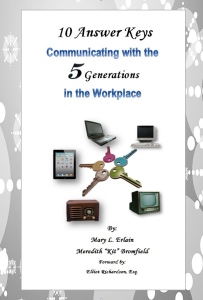Excerpt from “Empowering the Multi-Generational Workforce”
Generation X’ers (1965-1976) 
- 35% are non-white and 29% are legal immigrants
- Most educated as compared to the preceding generations
- Independent
- Highest number of divorced parents
- Dual-income families
- Self-sufficient (e.g., took care of chores and other responsibilities after school and before parents returned home from work)
- Realists
- Informal
- Result oriented
- Intolerant of bureaucracy
- Heroes
- Not really influenced by any real heroes
- Defining Events
- Collapse of Communism
- Missing kids on milk cartons
- Computers in classroom
- Recession (1980s)
- Persian Gulf War
- Rodney King incident
- The Challenger disaster
The Gen X’ers quest is to have much more balance between their work and personal live. They want that community feel inside a workplace. Face it, if it has not already happened in your organization, the X’ers will be taking their place in key leadership and management roles. How can your current organization be structured and can an X’er move into the role seamlessly while allowing them to flourish at work while maintaining the balance with their personal life?
Here are some key excerpts from the “10 Answer Keys, Communicating with the 5 Generations in the Workplace” book.
The Gen X’ers entered our workplace with a different work style than the previous generations. Currently they are about a third of the workforce. They place a premium on family time, and have a different attitude about work. NOT WRONG, just DIFFERENT.
Gen X’ers dislike rigid work requirements. They value a level of freedom to establish their working hours. If their production quotas are met, it is best to offer some flexibility. Rigidity will foster resentments and affect their performance and productivity. Flexibility will motivate this generation. Gen X’ers respond to mentoring. They appreciate regular feedback on their performance. Don’t be surprised if they feel like they are “sandwiched” in your organization, especially if you have a generationally diverse organization. They have an entrepreneurial spirit which can benefit an organization if leadership is willing to tap into it. Don’t forget the family life; create those events that incorporate family members. These small things can go a long way in encouraging a Gen X’er to perform at their peak.
To the Gen X’ers, limiting meetings to a minimum is a way to manage time. They do appreciate technology as a tool to manage time as they were the first generation who had technology incorporated to streamline their learning process.
Gen X’ers are direct and want direct communication. They have had sufficient exposure to technology and prefer to use it to streamline their work efforts. Limiting the number of in-person meetings is preferable to the Gen X’ers. They desire to have a voice and often have a wealth of information to share. This generation often is squelched by the larger and more prominent Boomers. Look for those non-verbal cues of dissatisfaction.
Pushing Gen X’ers along with micromanagement will create an unhappy situation. They will be an open book in non-verbal ways when unhappy. They dislike the having meetings about meetings approach to business. Look for the subtle and not so subtle signs of disengagement such as aggression, daydreaming, rationalization, and repression. Understanding the reasoning behind certain actions – why people act as they do – can help you deal effectively with people when they seem completely irrational to you. All behavior is designed to satisfy some need, and even unproductive behavior in the workplace usually arises from some unmet, internal personal need.
Quoting Deborah Gilburg from “Leadership and Generation X” CIO.com. Effective leaders equate personal success with organizational success, are willing to risk taking a stand for what is important to the future success of the organization as a whole, commit to building the relationships and networks needed to gain trust and cooperation, and instill hope in others for a better way. It starts with clarity about one’s own values and the integrity to live by those values, and I believe many Gen X’ers already possess that. But leadership requires more of us. It requires that we work to instill those values into the systems and institutions that impact our lives and our kids’ lives. It requires that we build networks with each other, and yes, with those Baby Boomers who are so empowered by and absorbed with their own connections. It requires us to stretch past our modular ways, engage with others who share our concerns, and learn the art and science of wielding influence to effect change.
It is my hope that we can start to become resources for each other, to connect around the commonalities in our lives.

Recent Comments